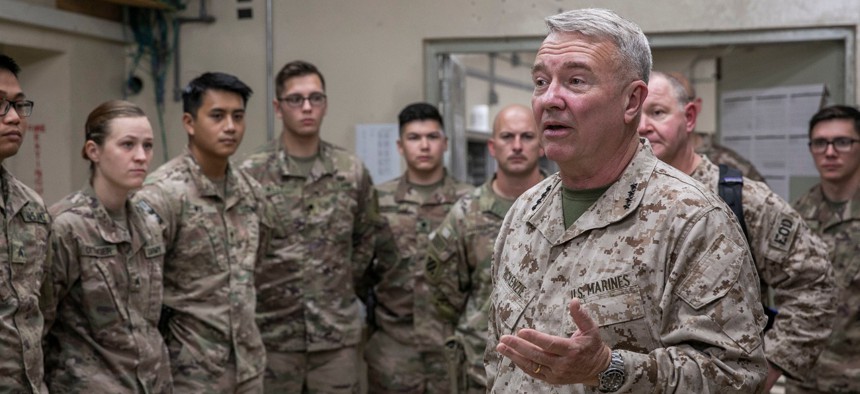
U.S. Marine Corps Gen. Kenneth F. McKenzie Jr., the commander of U.S. Central Command, speaks to U.S. soldiers during a visit to Jalalabad, Afghanistan, in 2019. Sgt. Roderick Jacquote / U.S. Marine Corps
Iran Is Our Top Priority, Says Senior US Commander In Middle East
Shiite military attacks have made it harder to fight ISIS, Gen. Kenneth McKenzie said.
Countering the threat from Iran is the U.S. military’s top priority in the Middle East, America’s top commander in the region said Wednesday, blaming rocket attacks from Shiite militia groups in Iraq for hampering U.S. efforts to defeat ISIS in the region.
"As I look at the theater, we remain focused on Iran as our central problem. This headquarters focuses on Iran, executing deterrence activities against Iran, and doing those things,” U.S. Central Command head Gen. Kenneth McKenzie said at an U.S. Institute for Peace event.
“The threat against our forces from Shiite militant groups has caused us to put resources that we would otherwise use against ISIS to provide for our own defense and that has lowered our ability to work effectively against them,” McKenzie said.
In March, U.S. forces began pulling back from bases across Iraq, turning them over to Iraqi security partners. At the time, Pentagon officials insisted that the base hand-offs were part of a long-planned consolidation that reflected the success of the anti-ISIS fight — not concerns over the ongoing rocket attacks by Iran-linked proxy militias.
On Wednesday, McKenzie reiterated that justification, saying that Iraqi security forces had improved their ability to fight ISIS and that “the fact that we’re getting smaller is actually a sign of campaign progress.”
But the CENTCOM commander also explicitly linked the withdrawals to the threat from Iran.
“Over the last seven or eight months, we have had to devote resources to self-protection that we would otherwise devote for the counter-ISIS fight and we’ve had to pull back and our partners have had to pull back,” he said. “At the same time we've done things to harden our positions to make it more difficult for Iran to attack us in Iraq — but it has had an effect.”
Rocket attacks have continued to target U.S. military and diplomatic installations in Iraq during the spring and summer, although tensions have ebbed since January, when the United States killed top Iranian general Qassem Soleimani. The Trump administration has made constraining Iranian military adventurism in the Middle East a cornerstone of its foreign policy. In 2018, the president withdrew from the Iran nuclear deal struck by his predecessor, in part over concerns it didn’t go far enough to restrain other bad behavior from Tehran. Critics say Iran is now closer to acquiring a nuclear weapon, while continuing to lash out militarily as it struggles under pressure from withering sanctions applied by the Trump administration.
McKenzie cautioned that a final “defeat” of ISIS is unlikely — because there will always be pockets of fighters enamoured with the ideology — but that the hope is that the United States will eventually be able to hand off the fight to local security forces.
"There's not going to be a significant victory celebration. There's not going to be a clear-cut military victory,” McKenzie said.
He also acknowledged that the U.S. military presence in Syria has no clear end in sight.
“I don’t think we’re going to be in Syria forever. I don’t know how long we’re going to be in Syria,” he said. “That’s going to be a political decision, not a military decision.”
But, he added, “As long as we remain, we’re going to work very hard to finish off ISIS.”







